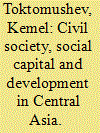| Srl | Item |
| 1 |
ID:
192869


|
|
|
|
|
| Summary/Abstract |
There is a paradox of social capital in Central Asia. Despite the efforts of the international community to promote civil society in the region, Central Asia has one of the most restrictive environments for associational life. Accordingly, the main goal of this paper is to change discourses about civil society in Central Asia and call for more research on the impact of social capital on development outcomes. Development efforts should recognize that besides non-governmental organisations, other networks and associated norms of reciprocity can foster positive social capital for the transformation of the region.
|
|
|
|
|
|
|
|
|
|
|
|
|
|
|
|
| 2 |
ID:
192866


|
|
|
|
|
| Summary/Abstract |
This paper argues that in China’s Xinjiang Uyghur Autonomous Region, work placements of re-education detainees and Xinjiang’s implementation of the national Poverty Alleviation through Labor Transfer programme for the transfer of rural surplus labourers operate under fundamentally different policies. Drawing on new documentary and witness evidence, it is argued that within Xinjiang’s unique context of frontier settler colonialism, its recent coercive labour transfer programme evolved alongside decades-long efforts to facilitate surplus labour transfers throughout China. From 2014, when Beijing shifted the region’s work focus towards de-extremification, Uyghur underemployment was framed as a matter of social stability and national security. Between 2017 and 2019, labour transfer coercion dramatically increased alongside campaigns of mass internment and of enforcing poverty alleviation work goals. Xinjiang’s shift in 2021 from a campaign-style mobilizational to an institutionalized approach deepens coercive risks of this often poorly understood coercive labour strategy.
|
|
|
|
|
|
|
|
|
|
|
|
|
|
|
|
| 3 |
ID:
192867


|
|
|
|
|
| Summary/Abstract |
A wealth of research examines the relationship between digital media consumption and political participation. Research typically defines participation broadly and focuses on Western contexts. We seek to add to the understanding of this relationship by focusing more directly on the relationship between digital media consumption and the propensity to vote among young people in a less democratic context. To do so, we examine a set of Central Asian countries (Kazakhstan, Kyrgyzstan, Tajikistan and Uzbekistan) that have varying degrees of democratization. We test whether digital media consumption stimulates voting among respondents aged 18–30, and if this is contingent on how free and fair are the elections. Our results suggest that in the most democratic country, Kyrgyzstan, the relationship between digital media use and the propensity to vote is relatively flat while digital media use in less democratic countries, overall, is associated with a decrease in the propensity to vote.
|
|
|
|
|
|
|
|
|
|
|
|
|
|
|
|
| 4 |
ID:
192865


|
|
|
|
|
| Summary/Abstract |
Although mental health concerns among university populations are on the rise, discussions of academia-related trauma rarely occur in published outlets. They are usually limited to informal talks and the private exchange of anecdotes during conferences and workshops. This is problematic because accounts of how to mitigate stress, anxiety and depression in the academic environment are valuable for both early-career and senior researchers. In being honest about the strategies that I have developed to protect my mental well-being, both during my fieldwork in Central Asia and the academic environment more generally, I do not wish to make totalizing generalizations about researchers’ trauma experiences in our discipline. By contrast, I hope that my account presented here will invite further academic discussion about the possibility of academia-related trauma and its implications for scholars’ work and mental well-being.
|
|
|
|
|
|
|
|
|
|
|
|
|
|
|
|
| 5 |
ID:
192868


|
|
|
|
|
| Summary/Abstract |
This article examines China’s ‘pragmatic cooperation’ approach in the Belt and Road Initiative (BRI) using the Sino-Turkmen natural gas engagement as a case study. The disputes between China and Turkmenistan about the natural gas pricing mechanism, supply and prospective development have worsened after the request for pragmatic cooperation within the BRI. This article suggests that depoliticized economic diplomacy – such as advocating for pragmatic cooperation – does not necessarily avoid political disputes. Instead, mutual awareness is the key to achieving a win–win result.
|
|
|
|
|
|
|
|
|
|
|
|
|
|
|
|